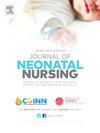新生儿重症监护室中早产新生儿父亲的应对策略、心理反应和支持需求
Q2 Nursing
引用次数: 0
摘要
方法 210 位伊朗新生儿重症监护室早产新生儿的父亲填写了医院焦虑和抑郁问卷、问题应对取向简表(Brief-Cope)和父亲支持需求问卷。 结果 抑郁和焦虑得分的平均值(标清)分别为 9.51(2.3)和 9.05(2.2)。63%的父亲采用情绪导向的应对方法。他们的支持需求主要体现在自我和家庭关怀方面。结果显示,回避应对策略与父亲抑郁之间存在明显的相关性(r = 0.15,P = 0.02)。他们可以通过识别和满足父亲的支持需求来管理他们的心理反应。护士应制定干预计划,减少父亲使用回避应对策略。本文章由计算机程序翻译,如有差异,请以英文原文为准。
Coping strategies, psychological reactions, and supportive needs of fathers with premature newborns in the neonatal intensive care unit
Purpose
The research aimed to determine the psychological reactions, coping strategies, and support needs of fathers of newborns in the NICU.
Methods
210 fathers of preterm newborns in the NICU in Iran completed the hospital anxiety and depression questionnaire, Abbreviated form of Coping Orientation to Problems Experienced inventory (Brief-Cope), and fathers' support needs questionnaire.
Results
The mean (SD) of depression and anxiety scores were 9.51 (2.3) and 9.05 (2.2), respectively. 63% of the fathers used emotion-oriented coping methods. Most of their support needs were expressed in self and family care dimensions. The results showed a significant correlation between avoidance coping strategies and fathers' depression (r = 0.15, P = 0.02).
Conclusion
Considering the experience of anxiety and depression in the fathers of preterm newborns hospitalized in NICU departments, nurses must support them. They can manage fathers' psychological reactions by identifying and meeting their support needs. Nurses should plan interventions that reduce fathers' use of avoidant coping strategies.
求助全文
通过发布文献求助,成功后即可免费获取论文全文。
去求助
来源期刊

Journal of Neonatal Nursing
Nursing-Pediatrics
CiteScore
2.00
自引率
0.00%
发文量
143
期刊介绍:
Aims & Scope: This is the practical, bimonthly, research-based journal for all professionals concerned with the care of neonates and their families, both in hospital and the community. It aims to support the development of the essential practice, management, education and health promotion skills required by these professionals. The JNN will provide a forum for the exchange of ideas and information between the range of professionals working in this field; promote cooperation between these professionals; facilitate partnership care with families; provide information and informed opinion; promote innovation and change in the care of neonates and their families; and provide an education resource for this important rapidly developing field.
 求助内容:
求助内容: 应助结果提醒方式:
应助结果提醒方式:


